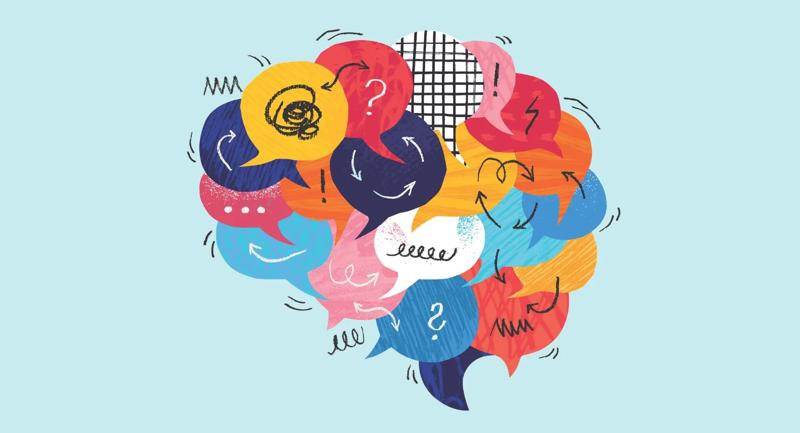As we emerge from the pandemic, opinions abound about why students are exhibiting such challenging behavior: too much screen time and social media, not enough socialization with peers and teachers, heightened levels of depression and anxiety, etc. Although these factors may exacerbate the frequency and severity of bad behavior, it's unlikely they are the actual causes for the increases in misbehavior teachers have reported since students returned to school.
What was true before the pandemic is still true today: Most problem behaviors are a way children adapt to—or avoid—challenging environments they cannot manage effectively on their own (Ducharme & Shecter, 2011). One thing that makes a school environment challenging for a student is when they don't feel capable of doing what is expected of them. That's why it's necessary to examine a student's problem behaviors in the context of their academic performance. Recent declines in academic achievement (NAEP, 2022) prompt us to consider whether students are misbehaving because they're struggling with the stress of being unable to do what we ask of them, not because they don't care or are refusing to do it. As an educational consultant and a learning science researcher, we've realized—and helped many teachers realize—that often behavior struggles stem from students having weaker executive functions and other cognitive skills.
The Root Cause of Many Learning Struggles
Many people attribute student misbehavior to out-of-school factors and operate with the view that individual student outcomes in academics and even behavior are out of teachers' control. Mounting evidence from the developmental and learning sciences, and our own work, suggests otherwise. In our work consulting in schools, we use MindPrint, a self-administered, scientifically validated cognitive assessment for students ages 8 and older that was developed at the University of Pennsylvania's Brain Behavior Lab. Through puzzle-like tasks, MindPrint measures cognitive skills across the domains of complex reasoning, executive functions, memory, and processing.
We have examined MindPrint data collected on similar groups of general education students before and after the pandemic. We found that MindPrint assessments administered to students, across a range of schools, socioeconomic backgrounds, ages, and locations, during the 2022–23 school year showed a notable increase in the percent of students struggling with executive functions—and with memory—compared with just before the pandemic and lockdown. This implies that difficulties with executive functions and memory retrieval may be two reasons students are now struggling more in school. Yet, while much has been written about the pandemic-related increase in adolescent anxiety and depression, there's been less said about the impact on executive functions and other areas of cognition.
Fortunately, both executive functions and memory skills can be supported in the classroom through well-established, relatively simple strategies. Addressing these cognitive challenges, and providing more academic supports for students who need them, could help many students who are acting out because of frustration tied to academic work return to calmer behavior—not to mention make teachers' jobs easier.
A Look at Executive Functions . . .
Executive functions is an umbrella term for cognitive functions, including working memory, attention shifting, and response inhibition. These core cognitive functions play a central role in daily functioning and encompass processes that enable a person to control their attention and behavior. For example, research on executive functions has shown their importance in learning and predicting academic outcomes (Miyake et al., 2000). So how could problems with executive functions underlie the challenging student behavior that has emerged since the pandemic? Well, many empirical studies from the brain sciences highlight the detrimental link between chronic stress, executive function, and problematic behavior (Evans, Farah, & Hackman, 2021; Tsai et al., 2020). Stress can weaken executive functions, which undermines the myriad of behavioral and learning outcomes that executive functions support. The high levels of chronic stress young people experienced during the pandemic may have weakened executive functions for some of them—which is likely contributing to increases in challenging behavior and declines in student engagement.
. . .
Luckily, teachers can support student executive functions in numerous ways. First, research in the brain sciences indicates that aerobic exercise like martial arts, yoga, or any kind of intentional movement practiced for as little as 20 minutes shows promise in improving executive functions in children (Lakes & Hoyt, 2004). So substituting academics for "specials" or recess to make up for lost learning may have the opposite of the intended effect. Better to let kids move and play!
Second, research has found that mindfulness interventions like meditation lead to better educational outcomes in adolescents (Caballero et al., 2019) by directly decreasing stress and negative emotions (Schonert-Reichl & Lawlor, 2010) and improving cognitive function (Casedas et al., 2020). We have heard of teachers seeing positive effects on students' behavior from as little as one minute of mindfulness at the start of every class period.
Finally, schools can use social-emotional learning programs that specifically help students build competencies in self-control, managing feelings, and interpersonal problem solving—skills related to executive functions. Several SEL programs—such as PATHS and CSRP—have demonstrated improvements in executive functions, even when cognitive skills aren't directly targeted. MindPrint Learning's BOOST Yourself course intentionally targets the development of both social-emotional and cognitive skills. Using such programs, teachers can support students' mindset, self-efficacy, and self-awareness, all of which play a role in students developing self-control and directly relate to behavior. What was true before the pandemic is true today: Most problem behaviors are a way children adapt to—or avoid—challenging environments.
A Look at Memory …
Memory retention and retrieval involves the ability to hold and recall information after it has been understood. Needless to say, memory skills directly impact learning outcomes. When students can't promptly recall fundamental information, it impedes their ability to extend their knowledge, problem solve, and demonstrate mastery. While weak retention most obviously affects cumulative subjects like math that rely on facility with math facts, formulas, and core problem-solving processes, weak memory retention and retrieval is equally detrimental in humanities, including in ELA courses, where students rely on remembering vocabulary, grammar rules, and details from texts they have read.
Memory-related academic struggles could also tie into behavior problems (or a teacher's perception of a problem). Teachers might question students' level of engagement when they don't remember basics covered in prior weeks or courses, or may attribute poor test results to lack of effort or motivation. Kids might feel painfully aware of what they don't know. After experiencing repeated attempts and failures, a student may stop engaging or act out to distract from their inability or to avoid difficult work.
… And How to Support Students' Retention
Pandemic-related increases in chronic stress have also been associated with memory decline (Feter et al., 2021). But fortunately, memory challenges can be addressed once they're recognized. If teachers find that memory is an issue for students, there are steps they can take to help students with such problems succeed. In the short-term, teachers should identify and prioritize the most important subject-specific knowledge gaps that are interfering in their students' learning. Teachers can also allow students to readily access information they need—perhaps with an open-book policy during tests or a page of notes students can keep handy—so poor memory retrieval doesn't prevent students from progressing within the subject matter.
Students are stressed when they don't feel capable of doing expected academic work. So we should examine a student's problem behaviors in the context of their academic performance.
For a more long-term solution, we must explicitly teach students how to study so what they learn "sticks." Once students can study effectively, teachers can backfill essential information forgotten from previous courses to prepare students for future learning. Unfortunately, there is overwhelming evidence that the most common study strategies, like rereading, highlighting notes, and "cramming" before a test, are also the most ineffective strategies for learning (Karpicke & Roediger, 2008; Rohrer & Pashler, 2010). To enhance memory retention, students should be taught active study strategies that are challenging and more effortful. Strategies like completing end-of-unit comprehension questions, generating test questions, or engaging in peer teaching all create moments of desirable difficulties (Bjork & Bjork, 2020).
When students practice retrieving or remembering information—also known as retrieval practice or the Testing Effect—it enhances later retention and retrieval of that information, more so than when students "relearn" material passively (Roediger & Karpicke, 2006). Regular, low-stakes formative assessment and making practice tests available are ways teachers can capitalize on the Testing Effect.
Another strategy to facilitate memory retention is distributed learning—learning that's spaced out rather than crammed. Similarly, interleaving—alternating the material one studies rather than studying one topic in a block (such as, for a foreign language class, studying verb tenses for an hour, then reviewing vocabulary and common expressions, then returning to verbs) also leads to better recollection of material. Teachers can support student learning by repeating key information in the beginning, middle, and end of class, not only to emphasize what's most important, but also to increase the likelihood students will remember it. Interspersing content from previous lessons into class discussions and formative assessments will have similar benefits.
The Good News
Educators need to realize that the key to addressing behavior challenges is often addressing potential learning challenges. Misbehavior is likely to be a symptom of the problem of poorer cognitive functions, not the problem itself. This is actually good news. It means that when teachers recognize the root cause of students' behavioral struggles and make instructional adjustments to address cognitive functions, better student self-regulation, engagement, and—ultimately—improved behavior should follow.
Reflect & Discuss
➛ Think about those students who consistently show challenging behavior in your class. Are they also struggling academically? Do you see any connection between their academic and behavioral struggles?
➛ Have you noticed any difference in students' executive-function-type skills since the pandemic? Do many have more trouble focusing or organizing their work, or remembering what they learned?







